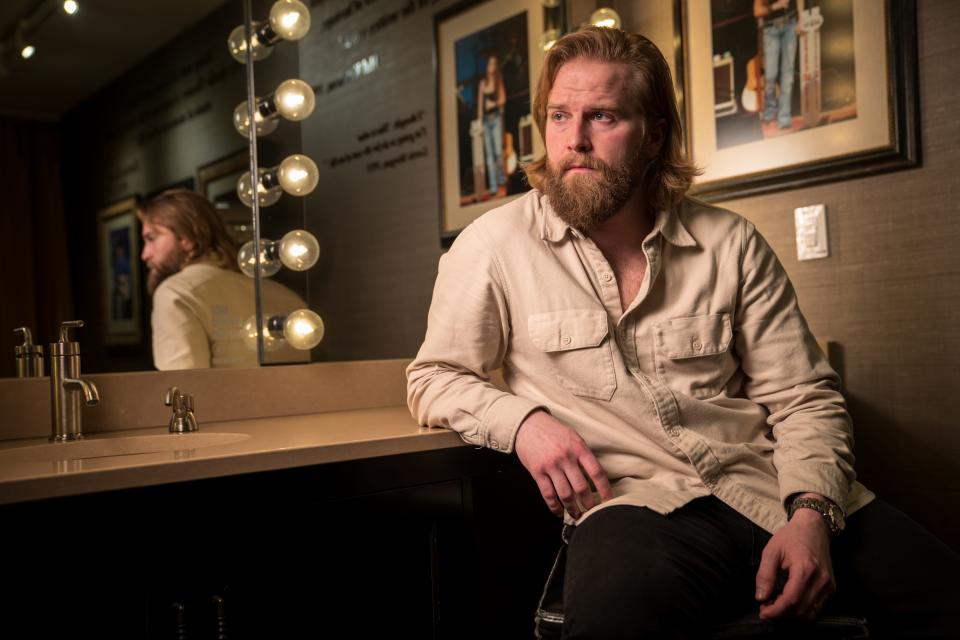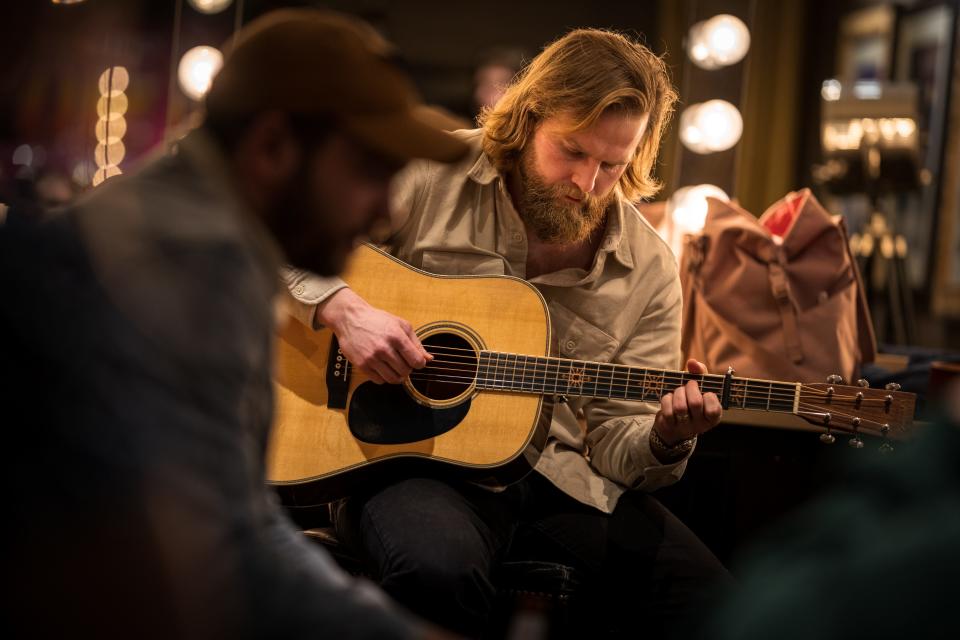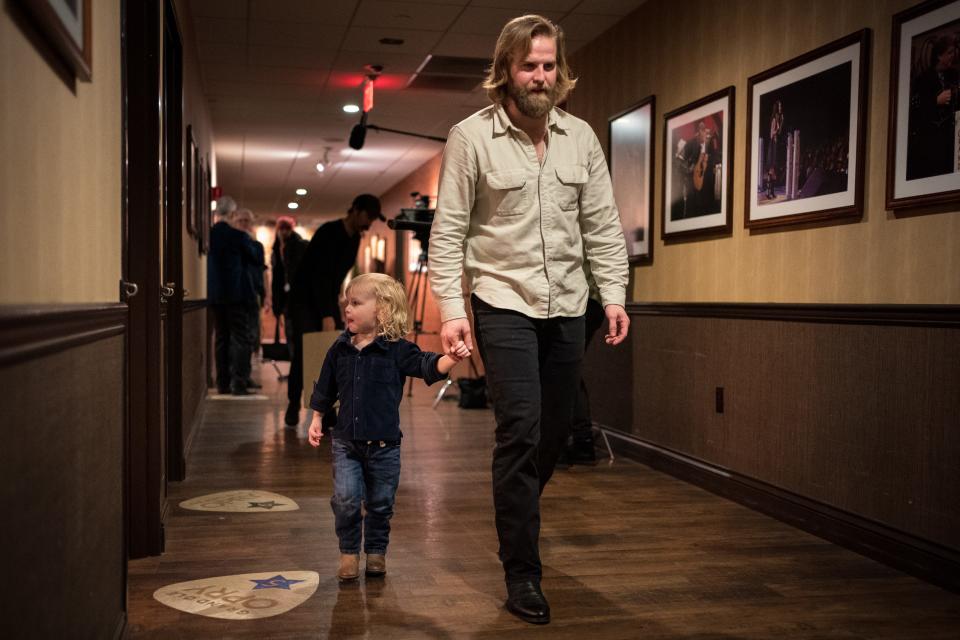Charles Wesley Godwin on crafting independent country music stardom
- Oops!Something went wrong.Please try again later.
- Oops!Something went wrong.Please try again later.
- Oops!Something went wrong.Please try again later.
Moreso than anything else in the dressing room that Morgantown, West Virginia-native Charles Wesley Godwin occupies before his Grand Ole Opry debut, he identifies with a name posted on the wall from a country legend with a seven-decade career and legacy, who is minimally twice as tall as his stature and who was a native of Bolt, West Virginia, 180 miles from Morgantown.
"Man," he says. "Little Jimmy Dickens."
How Godwin, 29, ended up at the Opry involves being a son, grandson, husband, father and West Virginian proud of his family and state who listened to copious amounts of Blue Ridge Mountain and coal-mining Kentucky-based folk and bluegrass greats like Doc Watson and Chris Knight, plus touring heavily, with occasional trips into century-old churches-turned-recording studios.
Also, add driving up Interstate 79 between Morgantown and Pittsburgh, where his producer, Berklee College of Music-educated Al Torrence, runs the nearly half-century-old Music Garden Studios, where his band, the Allegheny High, rehearse.
Then, mix in a harrowing 2019 story that begins with Godwin noticing a bunch of cranes in the sky near Potter Township, Pennsylvania — a town bordering the Ohio River where Shell was building an enormous petrochemical complex for processing natural gas-based ethane into ethylene, a vital product used to make plastics.
Curiosity spurred Godwin to ask locals about the land where the plant was being built.

"[The townspeople] called out the police because the construction had cut down trees, which had unearthed a shallow-buried body," Godwin says. "They thought it was a recent murder. However, the data on the bones revealed that the person had been buried there for 150 years.
"Murder ballads allow me the avenue to blend my love of history and storytelling," says Godwin, connecting how the story led to the creation of his 2021-released epic, "Cranes of Potter."
He dives deeper into his process and notes that an honest interplay of fact and fiction is at the core of his work. For "Cranes of Potter," he crafts the story of how that body — in his mind of a young woman caught in the throes of an affair gone wrong — was murdered and buried.

It's easy to be mesmerized by Godwin's bearded face, baritone voice and evocative story songs and believe him to be some rustic-revivalist everyman singing sepia-toned, coal-dusted and campfire-lit ballads. Or, to lump him in with Zach Bryan and think him a singer-songwriter rising from out of nowhere and capable of penning hundreds of powerful, Americana-leaning country songs to kick off a rabble-rousing party at Red Rocks Amphitheater.
That's all partially correct. However, the other side of Godwin's humanity may be far more human and commonplace.
"I partied as much as I played guitar at bars at West Virginia University. I also loved WVU football since I was a child. Major Harris, Amos Zereoue, Marc Bulger, Pat White, Steve Slaton, Owen Schmitt, all of them. The whole deal," he says, rattling off three decades of Mountaineer football stars.
He adds that growing up seeing his father work as a coal miner, helping his grandfather labor as a farmer — while also loving hunting and fishing in the woods — has rounded out a diverse set of influences and circumstances "all in [his] blood."

"I'm as motivated by writing somber songs as I am by having a good time."
Seeing Godwin live and having a good time has become a thriving cottage industry for Godwin of late. He's still unsigned — his two albums (2019's "Seneca" and 2021's "How the Mighty Fall") are self-released — but touring for four-day, Wednesday-Saturday runs for large swaths of the next quarter of 2023.
"My career is predicated on having gratitude for my fans," Godwin says. "Them attending more of my shows than ever before has allowed me to grow from not having to continue sleeping in my car with my dogs to sleeping in a hotel every night."
More music:The Chicks to play Nashville's Bridgestone Arena on 2023 tour
'Bluebird Days':Jordan Davis gets vulnerable with new album
Much of that is driven by his voice, called a "tight, old-world vibrato" by Rolling Stone.
Its resonance is a still-developing aspect of Godwin's craft. The performer notes that he's evolved from mimicking the likes of artists like Knight and Watson and comfortably honing in on discovering the power of his authentic, "God-given" instrument. However, at times it bears his Irish, folk-laden roots in a way that drives away fans of the intersection of country and Americana familiar with more blues and soul-inflected sounds.
Mentioning God in any conversation with Godwin of late also automatically lends itself to discussing his most recent release-ready recordings.
His "Live from the Church" EP was created at Pittsburgh's Church Recording Studio (housed in a 70-year-old former Presbyterian church) and is available on Feb. 17. As well, he's recently spent time at Echo Mountain Recording Studio, housed in a near century-old Methodist church in Asheville, North Carolina.
Before any mentions of divine inspiration, Godwin, as expected, tempers great expectations with practicality.
"Well, honestly, I now record in church studios because a) I can afford it, and b) they have main rooms big enough to allow my eight-piece band to record to tape simultaneously, with isolation," Godwin says. "We nailed almost all the tracks on my latest releases within the first three takes.
"And yes, church studios, especially at Echo Mountain for two weeks, offer you the best recording experience of your life. Singing about my son under stained glass was a magical experience. Taking in those surroundings makes you grateful for your career and success."
Godwin recalled a 2017 show in which he played for a literal audience of one — plus the bartender — at Fort Worth's Magnolia Motor Lounge. The Saturday preceding his interview with The Tennessean, he had his concert moved from Pittsburgh's 400-capacity Thunderbird Music Hall to the 2,300-seat Studio AE venue, which he sold out.
"In five years, I've gone from feeling like just putting my head down and doing my job as a musician was the worst thing in the world to feeling the excited, nervous responsibility of providing a crowd with an amazing show."
Godwin offers a contemplative note when asked about the artist and person his fanbase can expect to discover at this point of his career.
"I'm writing songs for myself that will hopefully provide happiness and enjoyment for people having good and hard times," he says. "The more I put rural American life and its sentiments into song, the more I think it'll turn more folks onto my home state and region. So many people there live their daily lives who might also have some of the best voices people could ever hear. I hope my success inspires more young people from my state, who deserve to be heard, to follow in my footsteps."
This article originally appeared on Nashville Tennessean: Charles Wesley Godwin on Grand Ole Opry debut and country acclaim

